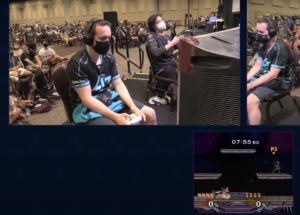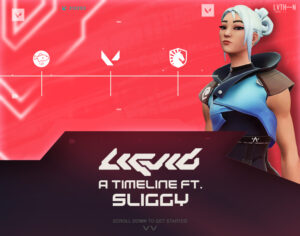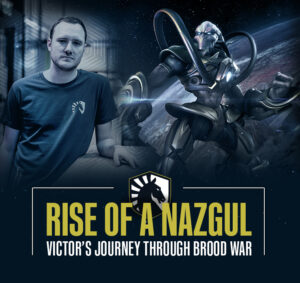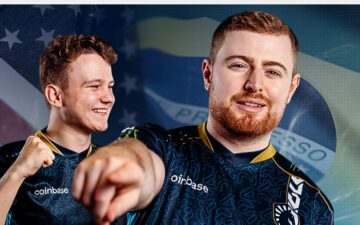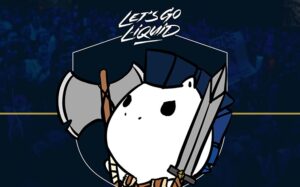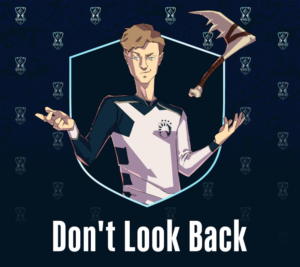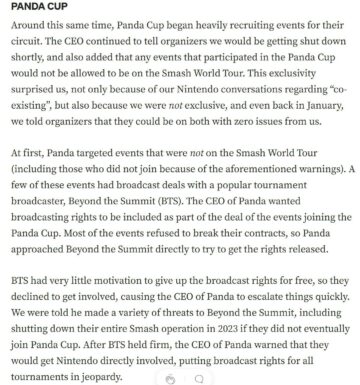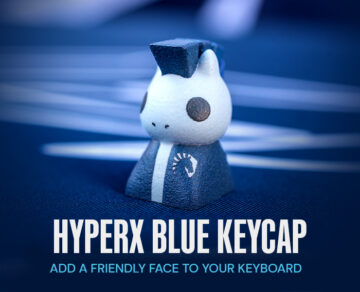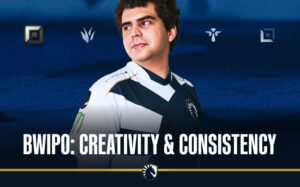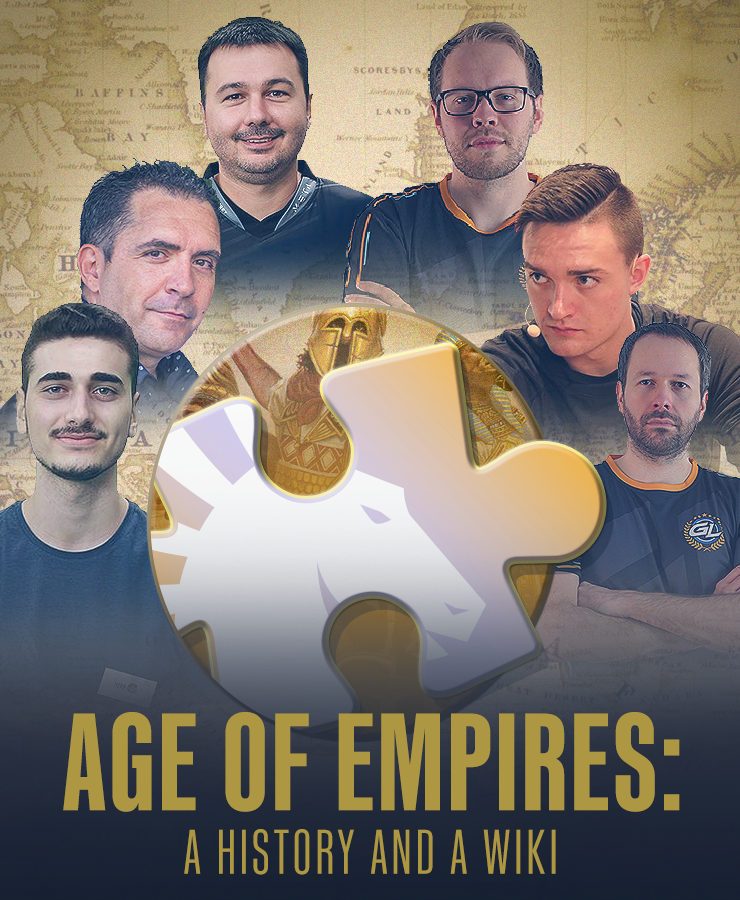
Age of Empires: a History and a Wiki
Age of Empires esports is a fascinating subject of research – in part because of how much is lost. Real-Time Strategy titles, in general, carry a massive amount of history, much of it lost to time as the initial rise of esports of the early 2000s faded after the global economic recession. The infrastructure that supported sites for brackets or early forums gave way to apathy.
Still, the game itself never gave way. Age of Empires has survived server shutdowns, no outside investment, and massive player migrations only to mount comebacks and continue to grow. These days the scene interlaced the old with the new. Legends of the past like TheViper, DauT, and Capoch stand side by side with the youngsters of Hera, and Liereyy. Known organizers that relied on their communities can now tap into the larger World’s Edge war chest to partially fund the esport scene. To record this evolution, the contributors of Liquipedia took on the challenge of making a nearly complete record of over two decades of esports history.
In the middle of 2020, Age of Empires would become one of the fastest-growing Liquipedia wikis since the start of the Alpha wiki program. Big and small names in the community would rally together to consolidate an esports history that runs longer than most.
Inside AoE’s Liquipedia, you can see the history of the esport and of much of the RTS genre. Inside the building of the wiki, you can see key threads that kept the competition alive: the community, camaraderie, and a deep love for the games in the franchise. These are the elements that drove an entire scene to create a history that really befits the name: Age of Empires.
The WCG & Legion Clan Era
Age of Empire’s story best starts on its sequel – Age of Empires II. It is the most plentiful, the most known, and currently the flagship title for the entire franchise. At the time of its release in 1999, it was a critical success too.
Age of Empires II esports received tremendous support from Microsoft and the World Cyber Games, being part of that competition in 2000, 2001, and 2002. Hosting legendary titles like Counter-Strike and Brood War, making the WCG stage was no small feat!
However, WCG dropped the game from its event in 2003, moving to the newly released Age of Mythology instead. Age of Empires II players were not to be without a big tournament for long.
In came Legion Clan – a group that could have, in another timeline, turned into an early esport organization, similar to how Liquid came to be. (Imagine that alternate universe). It quickly grew into something of an exclusive club for expert players (also not unlike Liquid was for Europe’s StarCraft scene). They also put together some of the best events following WCG, including the World Clan League series.
Spanning four years with six events, the WCL had a collective prize pool of over ten thousand dollars. That was more than considerable at the time, especially for an esport with a sequel out. Naturally, winning a WCL was the dream of many players at the time.
Speaking of the sequel, while Age of Empires II was beginning to plant the seeds of generational talent, Age of Mythology struggled to get started. A lackluster WCG 2003 appearance gave way to discontinuing the franchise’s appearance in the WCG tournaments for four years. Given how healthy the Age of Empires II competitive scene was in comparison, some players forged on with Age of Empires II instead.
One of the earliest seeds and strongest talents would be DauT. He first played Age of Empires II competitively in 2002. Today he is a 36-year-old master of the game and one of esports’ most consistent competitors. It’s no stretch to say DauT sits among the top 10 players in the world and has likely never dipped below that standard.
![[image loading]](https://platogaming.com/wp-content/uploads/2021/11/age-of-empires-a-history-and-a-wiki.jpg)
Source: Liquipedia.net | alt: Daut’s earnings since 2002 broken by year.
As one of the best, DauT was, of course, part of Legion Clan, who would soon face the biggest setback and the biggest opportunity in the scene.
From Legionnaires to Tyrants
In the following years, Legion Clan would lose its biggest supporter, Arbalet, a man who financially backed most of the clan’s tournaments and had given nearly $100k in prize money to members of the scene. In his place, Canary took on the work of financier, but that money quickly dried out too.
With StarCraft II quickly becoming the flagship esport RTS and Age of Empires III entering the fray, the Age of Empires scene faced great competition and greater uncertainty. All the while, the oldest dynasties in AoE were collapsing. By 2011 Legion Clan began to lose steam and before then, even the online trade routes and town centers of the scene were under attack.
In 2006 Microsoft ended support for the MSN Gaming Zone service – the platform Age of Empires and many other CD-ROM games used to host matches. Without them, no online play was possible. Hard-nosed as ever, the community endured and built new alternatives.
A company called Voobly had a client capable of everything needed to continue supporting the multiplayer community. Voobly would become the de facto place to compete in Age of Empires II in the years following the MSN Gaming Zone shutdown, and the AoE community would find new ways to thrive in this new client.
When first exploring the AoE scene, it felt very different from what I was used to—coming from many “established” esports scenes with big LANs, big organizations, TO’s, etc. The AoE scene felt very “DIY” and small in comparison. But one that had a very passionate community for their game.
Jasper “Kano” Jacobs, Apex Legends Volunteer Administrator for Liquipedia.
Without the oversight of Ensemble Studios or Microsoft, players were free to develop their own patches for the game. They could adjust anything from the values of upgrades, buildings, and units to the AI pathing or how formations for groups of units worked. Maps were also being developed by members of the community, some around particular themes or with an element of challenge for players.
Legion’s grasp on the top level of the competition would be challenged by the old guard forming a new legacy, TyRant. Many of the first generation talent in the scene had retired for good but of the remaining players, DauT was the only one to jump into TyRanT early, while the rest either competed as part of national teams or smaller clans.
(An ascendant Viper beats teammate and old legend, DauT)
But DauT wasn’t the true king of TyRanT – the crown would not go to a veteran but to another seed of talent, a champion of the next generation. Ørjan “TheViper” Larsen. He joined the TyRanT project early in its foundation, and It wouldn’t take long for people to see that this 19-year-old player from Norway possessed a level of skill beyond that of most other players in the scene.
In the following decade, TheViper not only became the best in his generation but the greatest Age of Empires II player of all time. Since 2011, he has won 71 out of 119 tournaments he has played. Nearly 60% 1st place finishes.
And yet, the essential thing about TyRanT was not that they had TheViper or other world-renowned players on the team. But that they built a legacy not on the promise of unlimited winnings but on staying together, as a team, as friends, to support each other and the community as a whole.
A Community That Never Stopped Working
It’s easy to forget the scope of time we are talking about here. These players began playing Age of Empires II competitively nearly a decade ago and continue to push each other to improve as opponents and teammates. They push on in a small, grassroots and continually iterating scene for decades while many large, sponsored esports collapse within a few years.
That durability comes from heavy community effort and support. This effort saw an excellent harvest of rising players and new contenders from 2010 to 2016. Players like Hera, MbL, ACCM, Mr. Yo, and TaToH were showing their potential, and by the end of that period, they started to secure their first of many victories.
Most of the archives and what we know of the early Age of Empires scene comes from community effort too. For a long time, all the info was in web archives, retellings from those who lived them, or in the best cases, archived forum posts.
AoCZone was one such forum for Age of Empires II. It has since transformed into AoEZone to allow for fans of all titles. Paid for by the community and set up in the first place by TheViper’s father. Of the events before the existence of AoCZone, there is not much we can gather. Vods are often the one element contributors in Liquipedia were able to learn about what civilizations were used, maps played, and participants’ real identities.
As the modern era of the esport dawned, even its biggest events would come from the community.
The modern era of Age of Empires esports can be pinned to one such event: War is Coming in 2015. To this day, it remains the biggest prize pool in the franchise’s history by a few thousand dollars and It was organized by Voobly and backed financially by TyRanT. DauT, TheViper, JorDan, and the remaining South Korean veterans Khab and Nv won over $30k, with the second TyRanT team coming right behind with $25k.
(The opening to the 4v4 team battle between two different TyRanT squads.)
In the years after War is Coming, Twitch hit unparalleled growth, which gave a number of AoE content creators the income and exposure to support brand new tournament series for a truly global audience. Significant figures in the scene, like T90Official, Nili, Escape Gaming, and MembTV grew their audience and began to organize events for the scene.
Tournament series supported by these content creators and community members sprang across the years – many with unique and interesting twists. Nili, a talented competitor, caster, and community leader, would host a tournament entirely in his apartment. MembTV, one of AoE’s biggest casters and organizers, would make a tournament set entirely on desert maps. T90Official got even more innovative with an event where all participants’ identities were hidden.
The AoE community never wanted for ingenuity and character, but Escape Gaming would be the first to take a serious stab at modernizing and polishing tournaments for Age of Empires II. In mid-2017, they announced the Euro Cup, which culminated in a LAN event at Cologne.
A Modern Esport
Not a year had passed since Escape Gaming’s Euro Cup that the Escape team dreamt bigger. They would start Escape Champions League by June 2018, ending in 2019 with the LAN finals at the organization’s home in Manchester in the UK. It was a circuit that rivaled and recreated the WCL dream all the way back in the halcyon days of the mid-2000s.
The winner of the circuit was similarly a new name that called back to the esport’s long history. The team who hoisted the winning trophy? Team Secret, or as you know them, TyRanT.
In the latter half of 2018, Team Secret approached the members of TyRanT to acquire the majority of the team. TheViper, DauT, JorDan, Slam, and TaToH all played and won the Escape Champion League finals in 2019 under the new banner for the best team in the world.
![[image loading]](https://platogaming.com/wp-content/uploads/2021/11/age-of-empires-a-history-and-a-wiki-1.jpg)
Source: Liquipedia.net | alt: Escape Champions League.
After another successful year with the second edition of Nili’s Apartment Cup, King of the Desert, and Hidden Cup, the scene looked to not just stabilize once again but snowball past its limits. It no longer was just insiders looking to push the boundaries in their lonesome.
Twitch was actively supporting most of these creators, and Microsoft had just announced the Definitive Edition of Age of Empires II and with it World’s Edge, a new group within the publisher who would oversee everything related to the Franchise. It promised to modernize not only the game’s graphics but its tools for observers as well.
This was something that the AoE community already actively troubleshot in the past. The team at Capture Age worked for years to create strong observer tools for the game. Worlds Edge would step in, support the team directly, and make their work official. Microsoft would, in the years following this explosion of tournament series, begin investing considerable money in their prize pools as well.
Now, Liquipedia enters the picture. According to Ricci, the Head of the Alpha Wiki program, he was approached in November 2019 by robo_boro (Escape Gaming’s tournament organizer at the time) and Hitmarker’s LATAM lead, Márcio Medeiros, to begin collecting information on the scene for a potential wiki. Later in May 2020, Nili, who by now was part of the Team Secret roster, also jumped in the conversation. A month later, the Age of Empires Liquipedia was installed.
I simply use it [Liquipedia] daily for all the other games. I am following StarCraft 2, CounterStrike […] I felt something like Liquipedia was missing [from the Age of Empires scene], […] They already had a strong base, it looked good, and I think everyone coming together there made lots of sense.
Sven “Nili” Reichardt, caster, player, content creator, and tournament coordinator.
The Alpha Wiki Program is a process by which users can band together to build a new wiki for Liquipedia, with the oversight of Ricci. It has three stages, pre-alpha, alpha, and main. Generally, Pre-Alpha means that the Wiki has been installed and contributors, of which virtually all are volunteers, are setting up templates and modules. All the basic building blocks. Alpha Wikis have sound infrastructure, but lack content, which was a major concern for Ricci at the time.
I didn’t have high expectations. I barely knew the community, and I thought there were a lot of historical things that we needed to get for it to become good. I thought it would grow for sure, but that it would grow a lot slower than it actually did. Compared to other wikis, it actually grew up fast and that surprised me a lot.
Ricci, Head of the Alpha Wiki program at Liquipedia.
![[image loading]](https://platogaming.com/wp-content/uploads/2021/11/age-of-empires-a-history-and-a-wiki-2.jpg)
Source: Liquipedia.net / Salle | alt: First 15 month view traffic for Liquipedia wikis, Age of Empires ranks 5th.
Within a few weeks of the wiki’s opening, a handful of contributors sprung into action, many of which continue to dedicate a massive amount of hours to maintaining and expanding it every day. Known members and leaders of Liquipedia’s own community, Kano, Trev, and Pikana, provided a lot of support in the early stages, educating the new contributors and installing the various components needed for the Wiki to work. Less than a year later, the Wiki had ascended alpha status and became a main Wiki – now displayed alongside StarCraft, Dota, Counter-Strike, and other big hitters.
[…] It drew my interest a bit more since I played the game quite [a bit] when I was younger. Back then, I had no clue about competitive AoE […] I ended up learning that competitive AoE even existed! […]. When you’re setting up a wiki for a title that has existed for so long, you end up learning a lot of “history” of the competitive scene. It’s super interesting to see how competitive gaming looked like back then while I was maybe five years old at the time.
Jasper “Kano” Jacobs, Apex Legends Volunteer Administrator for Liquipedia.
Much of the current structure in the Age of Empires Liquipedia comes from StarCraft II’s wiki – luckily borrowing from a sister RTS community. However, the Age communities needed to build some custom-made modules in order to support all the franchise titles and even some community mod offsprings.
A number of new contributors helped kickstart the wiki (Redy, RobChang, Egerke, OLADUSHEK, and Eitan96). From there, known community members from AoE jumped at the opportunity to help grow what could be a definitive, lasting archive for one of esports most storied titles. (Robo, Nili, Nimanoe, Huehuecoyotl22.)
The main reason for the fast expansion is the number of people willing to spend their time gathering information and writing pages about events – some of which have happened 10-15 years ago. These community contributors help the scene’s growth just as much as content creators and definitely deserve a shoutout.
LidaKor, Age of Empires caster, organizer, and content creator.
Of these, Redy might be the MVP of the contributor team. He alone has more edits on the site than the next two high-volume contributors (robo and Longinator). From there, he eclipses all other contributors.
Honestly, it’s an amazing experience! Everyone here is just so friendly and motivated to create the biggest and most complete AoE database on the internet, that you actually can’t help but feel the same. It’s not least this special atmosphere, which keeps me going – while knowing, I’m doing something positive for the community alongside others, who are at least as passionate about this particular game as myself.
redy, Age of Empires volunteer Editor for Liquipedia. Source.
The Golden Age of Empires
Coinciding with a once-in-a-century pandemic, the era to come would also eclipse so much of what the esport had seen. While contributors in Liquipedia were digging through every bit of information in web archives and old forums, the scene’s tournament organizers and competitors were working on a new future.
The Red Bull Wololo was a new type of tournament. It used the new Empire Wars game mode introduced in Definitive Edition, which made matches generally play out faster. Being the only tournament with that format also gave it what every successful Age of Empires tournament series has – a unique touch.
2020 broke nearly all records for the scene and brought back many players who had either retired long ago or taken a prolonged hiatus. All of which were welcomed with open arms. Such is the camaraderie within the scene that players competing in its early eras can pick up right where they left off.
Capoch is the best example of a return in force, a flower that blooms more than thrice by now. Initially an Age of Empires II player and a member of Legion Clan, he later competed in Age of Mythology, Age of Empires III, Warcraft, and StarCraft II. But he made a legendary return to the scene in 2020, quickly catching up with the rest of the field and delivering what is widely considered the best series of matches that entire year.
There was also quite a lot of movement for players. Aftermath, which formed in 2017 and was arguably the second strongest team in the scene, nearly disbanded after members Hera and Liereyy were signed under Tempo Storm. But pandemic difficulties would force Tempo to retire the team, and thus Hera and Liereyy returned to Aftermath. Though Liereyy had achieved victory twice at Red Bull Wololo and taken the King of the Desert title, challenging the status quo for the foreseeable future.
Team Secret also saw a shakeup as they parted ways with the players and departed from the scene. However, the former TyRanT players were not without a home for long. German-based esport organization GamerLegion quickly swept in to sign them all. Even DauT, who many thought past his prime, still soared to a fantastic win in Red Bull Wololo 3.
DauT winning it [Red Bull Wololo 3] was a team effort, and nobody believed in the lord, but the team came together and did the strategies to make it possible. It was a great feeling not only for him but also for the community. […] Getting the community on our side and realizing we are here to stay and help grow AoE is not an easy task, but I think overall, we did a good job. […] This was only the first step.
Julian ”morxzas” Miculcy, GamerLegion Head of Operations.
Today, the scene grows faster than ever. As this esports scene builds on into new eras, its community can now also has the cleanest, most cohesive access to the past. Thanks to the efforts of Redy, Longinator, Fuhloh, SyntacticSugar, and dozens of more contributors, Liquipedia can proudly say they have a nearly complete record of the competitive history of Age of Empires esports.
Of course, it’s all a living record, as seen with the latest Red Bull Wololo 5. With one of the largest prize pools in the game’s history, set live, on LAN, from inside a real-life castle, it’s a sign that AoE and esports as a whole still has much more to show.
We have been very happy with (and pleasantly surprised!) by the growth of the Age of Empires II DE esport scene. The community has been wonderful with multiple fantastic tournaments over the last few years and their response energizes us. We are especially grateful with the partnership with Red Bull on the Wololo series. Two years ago we could only dream about being able to watch a Age II DE esport LAN event being held in a real-life castle!
Age of Empires Team, Microsoft.
Times are changing competitively too, TheViper, for the first time, was seen as an underdog going into that event, and he came out a winner to the surprise of people. Talent that has been brewing for years like Liereyy, Hera, MbL and Mr. Yo now threaten to upend the GamerLegion(/Secret/TyRanT) dynasty.
Age of Empires IV
A change in the standings is not the only thing on the horizon. Age of Empires IV is less than a month away from release. It is not just an anticipated title for fans of the series, but most RTS players. With Blizzard announcing a slow withdrawal from StarCraft II, Age of Empires entering a new era, and game developer Frost Giant approaching the ring – the genre feels alive with possibility.
People from StarCraft II, Warcraft III, Spellforce, Command and Conquer, Supreme Commander, and all across the RTS space have kept a watchful eye on Age of Empires IV. Some of these players even taking part in the most recent Technical stress test and others hosting tournaments before the game releases.
I think AoE4 has the potential to attract a bunch of new players and viewers to the scene. If it’s a good game, we might see some big tournaments, and I will grind to try and compete at the highest level. If it’s not as good as AoE2, perhaps we can continue pushing for AoE2 tournaments, and some new viewers will find their way there. It feels more like a new opportunity than a reset button.
Hamzah “Hera” El-Baher, Age of Empires II professional player.
Most recently, Elite Gaming Channel, which mostly focused on Age of Empires III, announced what will likely be the first major event for the game: GENESIS. With a prize pool of $20,000 dollars and only a few weeks after the release of the game. After a tense qualifying competition this past weekend, a diverse group of eight players will play out the first, of hopefully many majors in Age of Empires IV esports.
There are some franchise greats that community members may know – like Kasva, Hera and Viper from AoE II or RecoN and TheMista from Age of Mythology. But in a promising show, the game has also drawn from the wider RTS world, pulling Warcraft 3 pros LucifroN and Vortix as well as StarCraft’s own MarineLorD.
Although a new entry in the franchise is almost here, it is not a competitor seeking to drown out old titles. In my talks with the development team at World’s Edge, they made it clear that they are proud of the work they’ve done for Age of Empires II, specifically Definitive Edition. They still see AoE II as a title that will keep growing for years to come.
We always had hopes to be able to help the Age of Empires esports grow bigger. The speed of the growth did beat our initial expectation — it has been a super fun journey to see all these world-class players emerge and compete on the world’s stage. Can’t wait to see the scene continue to grow even bigger and more vibrant in the future. For Age of Empires IV, we’ll have more to share at a later date. What we can say is we expect the Age II DE competitive community to continue thriving even after the launch of Age IV.
Age of Empires Team, Microsoft.
Nevertheless, reading most forums and social media platforms, you might feel that working towards growing the Age of Empires esport community is a futile attempt. It will never reach the heights of StarCraft, or big organizations will not take a chance on a game that “peaked” in the 2000s. I am here to argue that was never the point of these scenes.
If the last two decades of these games have a singular clear statement, is that their players, competitors, casters, analysts, organizers, everyone is passionate, just as passionate as any other scene. They love, adore, their games. Each might have its own flavor, but it is their players’ favorite.
Age of Empires esport never sought validation from the rest of the industry. It never asked if it was allowed to call itself an esport title. It just did it, and when people took notice and gave the scene the tools and resources to succeed, it used every single one to great effect.
To me, the Age of Empires Liquipedia perfectly encapsulates this. Twenty years of history are carefully laid out for anyone who wishes to visit and learn what this scene has been doing for so long. Thanks to Liquipedia, the people’s history, culture, and spirit of Age of Empires esports will always be there, a living and growing monument to their passion, unwavering since 1997.

Writer // Sebastián “Adico” Quintanilla
Editor // Austin “Plyff” Ryan
Graphics // Kaitlyn Jang
- &
- 000
- 2016
- 2019
- 2020
- access
- Action
- AI
- All
- among
- announced
- Announcing
- Archive
- around
- Atmosphere
- audience
- Battle
- BEST
- Biggest
- Bit
- Borrowing
- brand
- build
- Building
- Bunch
- call
- cases
- challenge
- challenging
- change
- club
- Collecting
- cologne
- coming
- Communities
- community
- company
- comparison
- competition
- Competitive
- Competitor
- competitors
- components
- Contenders
- content
- continue
- contributor
- Conversation
- creator
- Credits
- Culture
- Current
- cyber
- Database
- day
- decades
- delivering
- develop
- developed
- Developer
- Development
- DID
- Diy
- dollars
- DOTA
- dozens
- dropped
- Early
- Earnings
- Economic
- Edge
- editor
- Enters
- Esport
- esports
- essential
- Euro
- Event
- events
- evolution
- Exclusive
- expanding
- expansion
- eye
- Face
- fascinating
- FAST
- First
- first time
- flower
- format
- Foundation
- Franchise
- Free
- fun
- fund
- future
- game
- Games
- Gaming
- General
- generation.
- Genesis
- Global
- good
- graphics
- great
- Group
- Grow
- Growing
- Growth
- harvest
- head
- here
- High
- history
- Home
- hosting
- How
- HTTPS
- i
- image
- improve
- Including
- Income
- industry
- info
- information
- Infrastructure
- innovative
- interest
- Internet
- investing
- investment
- IT
- Job
- journey
- jump
- Key
- King
- Korean
- large
- LATAM
- latest
- launch
- lead
- LEARN
- learning
- Level
- Liquid
- Long
- looked
- love
- major
- Majority
- Making
- man
- manchester
- Maps
- May
- Media
- Members
- Microsoft
- Modern
- money
- MSN
- multiplayer
- Mythology
- names
- net
- Norway
- official
- online
- open
- Operations
- Opportunity
- order
- organizations
- Other
- pandemic
- Partnership
- Patches
- People
- picture
- platform
- Platforms
- play
- player
- players
- Playing
- pool
- Pools
- Positive
- Posts
- potential
- prize money
- Process
- professional
- Program
- project
- Pros
- pulling
- rally
- RE
- Reading
- real-time
- recession
- record
- records
- Red Bull
- RELATED
- Releases
- research
- Resources
- response
- REST
- Ring
- rise
- s
- seed
- seeds
- sense
- Series
- server
- Service
- set
- setting
- Share
- shutdown
- Sites
- SIX
- small
- smaller
- So
- Social
- social media
- social media platforms
- South
- Space
- speed
- spend
- Sponsored
- Stage
- Starcraft
- start
- started
- Statement
- Status
- stay
- Steam
- Storm
- Strategies
- Strategy
- stress
- success
- successful
- support
- Supported
- Supreme
- surprise
- Talent
- talents
- talking
- Talks
- Tap
- Technical
- Tempo
- test
- The
- the world
- time
- top
- touch
- tournament
- Tournaments
- trade
- traffic
- Twitch
- Uk
- unique
- upgrades
- us
- users
- veteran
- Veterans
- View
- viewers
- volunteer
- volunteers
- wait
- war
- Watch
- web
- weekend
- What
- What is
- WHO
- win
- winning
- winnings
- within
- Work
- world
- writing
- year
- years
- youtube

